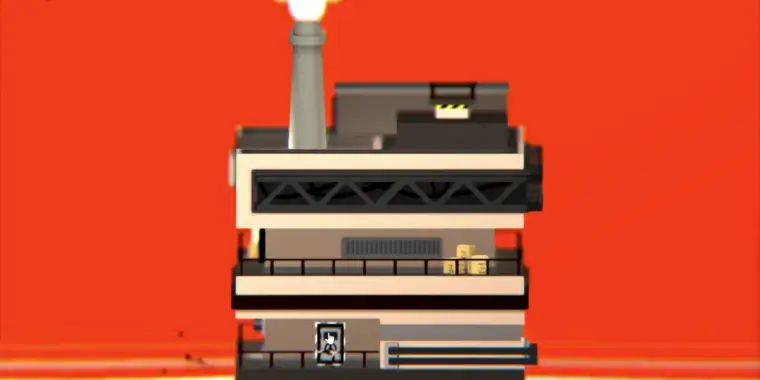Archive link: https://archive.ph/168Vn
There are now several games known to be getting delisted by WBD. I will link to the article with the list at the end
Some key highlights:
Warner Bros. Discovery, as part of its ongoing effort to stretch the definition of “entertainment company,” recently told a solo indie developer it would be “retiring” his 2016 dreamlike puzzle adventure game Small Radios Big Televisions from the Steam and PlayStation stores. The developer, in response, has made it free to download for PC
Deery clarified that the game will be pulled in the next 60 days. Deery noted that Adult Swim Games “hasn’t really been a thing for many years now” and that most of the people he worked with had moved on. “When you’re working with purely digital products nothing is going to stay around for very long,” Deery told Game Developer.
The reason given by Warner Bros. Discovery, as seen in the notice that Game Developer also reviewed, was “internal business changes.” “Thank you for your contribution to our game library and understanding during this transition,” the notice concludes. “We are available should you have any questions.”
Warner Bros. Discovery executives said late last month during a financial call that its gaming business was due for a “tough” year-over-year comparison. That is largely due to Suicide Squad: Kill the Justice League
At a higher level, the merged Warner Bros. Discovery entity has shown no hesitation when it comes to folding known names and removing content. The firm killed the fully produced Batgirl and a Scooby-Doo film prior to release as a reported tax strategy.
It’s hard to imagine how much it would cost to maintain storefront support for this sub-$20 game from 2016, but it was apparently too much for Warner Bros. Discovery.
The list of Adult Swim games can be found here: https://delistedgames.com/as-more-developers-confirm-it-looks-likely-that-all-adult-swim-games-titles-will-be-removed-by-may/ (Archive link: https://archive.ph/fjt3Q)
It’s honestly very sad how corporations can just throw their work in the trash if they think it will make them more profit there. I’m glad Deery was able to release it on his own for free so the game won’t be lost, but it’s unclear if all the developers will be able to do that.
I can’t imagine how frustrating and disheartening it must be as an artist to create something to share with the world only for it to be essentially buried underground because someone decided they could make a little extra money if no one ever sees what you made…
It is going to be removed, just it’ll be free until then.
quietly seethes at corps
I think you can download it from Deery’s website (Link)(Archive link)
So I think (/hope) it’ll be available indefinitely-ish…
Ooo, that’s interesting. I was looking at “Deery clarified that the game will be pulled in the next 60 days.” and thought that meant the publisher had exclusive distribution rights and was choosing to destroy the thing. From that site it looks like your interpretation is correct, which is good! Sometimes it’s good to be wrong 😅
not gonna unseethe the corps, though
Suicide Squad bombed so hard that it’s killing every indie game under their umbrella.
Is this that “trickle down economics” I keep hearing so much about?
It really does feel like that’s what happened. Is WBD going to can something every time they lose an expensive bet?
To add insult to injury, I don’t think anyone was clamoring for an online-only looter-shooter version of this game. If they had just let Rocksteady do their thing, it probably would’ve been a hit. WBD (probably) meddled hard with what would’ve been a solid game, and now a bunch of smaller developers are paying the price…
That does not feel like a good way to build brand loyalty. Especially because no artist is going to want to give their work to a corporation who will throw it in the trash first chance they get.
This is just the same thing EA did with Mass Effect: Andromeda. Exec management wanted out of AAA singleplayer games, so they set the ME:A team up for failure, and then used that failure to justify the change to the shareholders.
WB wants out of large budget games, so they created a flop to justify it.
This is just the same thing EA did with Mass Effect: Andromeda. Exec management wanted out of AAA singleplayer games, so they set the ME:A team up for failure, and then used that failure to justify the change to the shareholders.
If that was the case, then games like Jedi: Cal Kestis and the upcoming Dragon Age and Mass Effect games wouldn’t even exist, even with the surprise success of Jedi: Fallen Order. But also, that’s not even what happened with Andromeda. What happened is that BioWare’s A and B teams screwed over the team that was making Andromeda constantly. That team (henceforth referred to as the C team) before had only had experience with the wildly considered to be worst DLCs of ME:3, and was working with an engine that was known for being incredibly hard to work with and temperamental with any game that wasn’t a first-person shooter.
Even so, they had to struggle without the help of the significantly more experienced team leads and were bullied constantly without resources. After the game failed, the C teams were then dummied out of the company to other sections of EA. BioWare then went on to make Anthem… without the C teams help who by that point were experienced enough to probably deal with some of the growing pains. Andromeda and Anthem were two games that were made entirely by the behest of BioWare, with little to no involvement from EA, because at that point, they were still the starling studio of EA. In fact, as an aside, the only involvement from an EA exec for Anthem was one of them was playing a vertical slice that ended up deciding the rest of the game because all the Exec said was that it was fun.
Correct
Jadon Schreier has written two great investigative pieces about this:
Andromeda - https://kotaku.com/the-story-behind-mass-effect-andromedas-troubled-five-1795886428
Anthem - https://kotaku.com/how-biowares-anthem-went-wrong-1833731964
Exec management wanted out of AAA singleplayer games, so they set the ME:A team up for failure, and then used that failure to justify the change to the shareholders.
Where are you getting this from?
They’re making it up
I assumed as much, but I decided to skip the chest pounding/defensive stage and go straight to the “show me a source“ stage
Call me crazy, but I think if a game can be “retired” by Warner Brothers (or another megacorp), and the dev doesn’t control it anymore, then it’s not really an “indie”.
On the other hand, Witcher 3 and Cyberpunk 2077 would actually classify as indie games, as they were published by their developer, not a third party.
But when everything gets one of the two labels, triple-A or Indie, they stop being meaningful quite fast.
By that logic most AAA games would be indies and most devolver games would not. Indie isn’t about publishing
An indie game, short for independent video game, is a video game created by individuals or smaller development teams without the financial and technical support of a large game publisher. …The term is synonymous with that of independent music or independent film in those respective mediums. -https://en.wikipedia.org/wiki/Indie_game
And then:
Independent music (also commonly known as indie music, or simply indie) is music produced independently from commercial record labels or their subsidiaries
An independent film, independent movie, indie film, or indie movie is a feature film or short film that is produced outside the major film studio system in addition to being produced and distributed by independent entertainment companies
They are independent, because they don’t have a publishing company calling the shots. That’s literally where the term comes from.
And that is why I said people have only two labels - they use “single person or small team = indie, big team or company = triple-A”. When they should be looking at who is publishing, and therefore who is funding the project, i.e are they actually independent, or do they depend on someone else for that monetary/technical/marketing support.Indie is used to refer to independent and small literally because that’s usually how it is. You’re completely ignoring the first thing you quoted which is about it being just a few people, which is by far the definition today. Witcher 3 is in absolutely no terms an indie game. It was produced by hundreds of people. It is so far from the actual definition that it’s laughable.
By your definition Stardew Valley isn’t an indie because Chucklefish published it. That’s just not how it works. Video games aren’t music or movies. The same rules don’t apply, literally exactly for this reason.
Stardew Valley was published by the developer themselves. He can do whatever he wants with the game and there is no publisher to tell him he can’t because it’s bad for business. If they want the next update to be the “Fuck Russia, fuck Israel, Taiwan is the real China!” update, they can do it. Cp2077 can do that too. Because they are independent.
D’ya think that goes for the games in question of the article published by Warner Brothers that are being pulled by them? Are they independent of the publishers, free to do what the creator wants?
That is why having just the two labels makes them rather useless. Which is the point I’m trying to make.
Stardew was published by chucklefish in the beginning, it was not published by Eric. He publishes it himself now, but that was not true several years ago.
Your point is dumb, I’m sorry.
are they actually independent, or do they depend on someone else for that monetary/technical/marketing support.
People don’t look at that because that’s not a useful metric. All the big publishers have their own studios so most things they publish are ‘independent’ by that definition, but they are the very thing people try to exclude when they say indie. In the indie definitions of both music and films, it is stated that they are independent from the established distributors, not that they are entirely self-distributed. It’s unreasonable to expect that from indie games.
And conversely for ‘independent’ to have any meaning it mustn’t include those who are in a position where others could depend on them whether through money, name recognition or some other thing. CDPR for instance, by the merit of being very well known and owning one of the most popular online stores is absolutely not an independent studio.
Edit: furthermore even when a large distributor is involved for marketing etc, this doesn’t mean the production of the art can’t still be largely independent.
Never deal with corpos, you will only lose.
The developer of Fist Puncher has an insightful “Promoted Comment” now on the Ars Technica article:
therealmattkain I’m one of the creators and developers of Fist Puncher which was also published by Adult Swim on Steam. We received the same notice from Warner Bros. that Fist Puncher would be retired. When we requested that Warner Bros simply transfer the game over to our studio’s Steam publisher account so that the game could stay active, they said no. The transfer process literally takes a minute to initiate (look up “Transferring Applications” in the Steamworks documentation), but their rep claimed they have simply made the universal decision not to transfer the games to the original creators.
This is incredibly disappointing. It makes me sad to think that purchased games will presumably be removed from users’ libraries. Our community and our players have 10+ years of discussions, screenshots, gameplay footage, leaderboards, player progress, unlocked characters, Steam achievements, Steam cards, etc. which will all be lost. We have Kickstarter backers who helped fund Fist Puncher (even some who have cameo appearances in the game) who will eventually no longer be able to play it. We could just rerelease Fist Puncher from our account, but we would likely receive significant backlash for relaunching a game and forcing users to “double dip” and purchase the game again (unless we just made it free).
Again, this is really just disappointing. It seems like more and more the videogame industry is filled with people that don’t like and don’t care about videogames. All that to say, buy physical games, make back-ups, help preserve our awesome industry and art form. March 7, 2024 at 12:51 am
Afaik steam games are never removed from users, just delisted in the store so you can’t buy them anymore.
So if they write it off, can they claim any rights if you pirate the games? There’s no harm done.
Sounds like the original creators of these games should get the rights back for chump change.
When you’re working with purely digital products nothing is going to stay around for very long
Illuminating and very worrying statement in this context
The firm killed the fully produced Batgirl and a Scooby-Doo film prior to release as a reported tax strategy.
Is this the supposed innovation that capitalism breeds?
Johnny Silverhand did nothing wrong.
🤖 I’m a bot that provides automatic summaries for articles:
Click here to see the summary
Discovery, as part of its ongoing effort to stretch the definition of “entertainment company,” recently told a solo indie developer it would be “retiring” his 2016 dreamlike puzzle adventure game Small Radios Big Televisions from the Steam and PlayStation stores.
The developer, in response, has made it free to download for PC, giving us a rare chance to actually experience the thing that a giga-corp has determined to be not worth your time, before it is wiped from the archives.
In a thread on X (formerly Twitter) Tuesday, Owen Deery, a self-described “small Canadian game developer” who works as Fire Face, provided a few details in replies.
Otherwise, you could purchase the hard-synth soundtrack as a show of support, which in this author’s opinion is very good music for working or feeling a combination of nostalgia and magnetic dissolution at the same time.
The firm killed the fully produced Batgirl and a Scooby-Doo film prior to release as a reported tax strategy.
WBD most recently dropped a head-scratching attempt at a merger with similarly debt-laden firm Paramount, while also initiating a 2024 crackdown on password sharing.
Saved 77% of original text.








